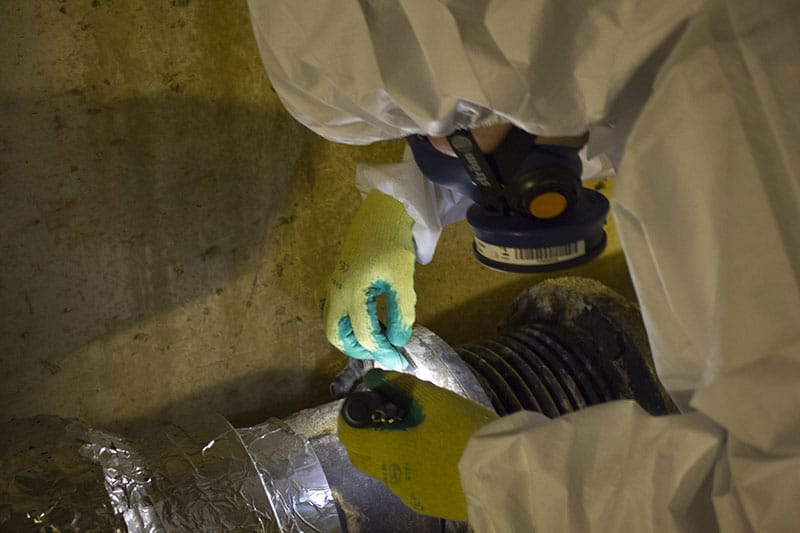Types of Asbestos Survey (Which Do You Need?)
It might seem hard to believe that, in some ways, asbestos remains the biggest cause of work-related deaths in the UK – yet, that is the case. More than 5,000 people a year pass away due to asbestos-related disease in this country, including conditions like mesothelioma and lung cancer.
We say “hard to believe”, because a generation – more than two decades – has now passed since the UK imposed its final ban on asbestos in 1999. Before then, however, asbestos was heavily used in industries such as shipbuilding and construction, especially in the period from the 1950s until the 1980s.
As a result of that legacy of extensive use, asbestos remains present in many buildings up and down the UK that were constructed before the year 2000. This, in turn, has led to the UK Government putting in place asbestos-related regulations to help ensure the safe and responsible management of the asbestos that remains in many UK buildings.
A vital tool for managing asbestos in such premises is an asbestos survey. However, different types of asbestos survey exist, designed for different circumstances. So, how can you be sure of the type of asbestos survey you will require for your premises?
Why do you need an asbestos survey?
As we touched on, asbestos continues to be present in significant numbers of buildings around the country. If anyone was to disturb this material, they could risk its carcinogenic fibres being released into the air. This, in turn, could mean someone inhaling or ingesting the substance, with all of its potentially extremely serious health risks.
You can probably begin to see why comprehensive asbestos regulations – to help manage and minimise the risk of asbestos exposure – are so important. Sure enough, the Control of Asbestos Regulations 2012 (CAR 2012) fulfil exactly this role in the UK.
One of the most important aspects of CAR 2012 for building owners and managers to be aware of, is the “duty to manage asbestos” that it imposes on people who manage non-domestic premises.
If you are the “dutyholder” under these regulations – in other words, the person with clear responsibility for the maintenance or repair of the given premises – you will need to take reasonable steps to ascertain whether asbestos is present on your site. If the material is indeed present, you should also be seeking to determine its location, amount, and condition.
CAR 2012 does not explicitly mention asbestos surveys. However, in practice, it is often only an asbestos survey that will enable you to learn details about the asbestos-containing materials (ACMs) that may be present in buildings for which you are therefore responsible.
Once you have arranged for an asbestos survey and you have found out the crucial information about any ACMs on your site, you will be able to devise a plan to manage that asbestos. It might therefore be mandatory for you to have an asbestos survey carried out at your premises.
Types of asbestos survey
You should now understand why asbestos surveys in general are necessary. However, we haven’t yet addressed what specific types of asbestos survey exist, and why you might choose one over the others. So, let’s summarise several broad types of asbestos survey.
Asbestos management survey
In a way, an “asbestos management survey” defines itself; it is the type of survey that a dutyholder might request to help them with the general management of asbestos on their site.
This is the first, and simplest type of asbestos survey. It is the type of survey that will enable you to learn the crucial details about asbestos on your premises – such as whether it is present, as well as its location, amount, and condition – if you aren’t presently planning any major works on the building. In other words, it focuses on managing the asbestos risks that might arise during the building’s normal day-to-day use.
An asbestos management survey typically takes the form of a visual inspection. The surveyor will note any materials that might contain asbestos, and consider what risks those materials might present during the building’s normal occupancy.
Asbestos management surveys are usually the least intrusive of all types of asbestos survey, with little damage being caused to the building. The surveyor might take some samples of materials for analysis, but they might also presume that certain materials contain asbestos without taking samples.
You should have an asbestos management survey in place if you are the dutyholder for any non-domestic premises built before the year 2000. An asbestos management survey isn’t normally required for domestic buildings except for any shared parts of those properties, such as lobbies, foyers, or corridors in a block of flats.
Refurbishment and demolition asbestos survey
If – as we explained above – you would arrange for an asbestos management survey to be carried out in circumstances where the building is simply being used normally, a refurbishment or demolition survey is the opposite. It is the type of asbestos survey that you would request in readiness for intrusive works being carried out on the property – specifically, refurbishment or demolition.
The differences between the two might seem relatively self-explanatory but are nonetheless worth being clear about: a refurbishment survey must be undertaken before refurbishment work is carried out on the property (or any other, similarly intrusive works). A demolition survey, meanwhile, is needed when demolition work is set to be carried out at the property.
Both types of survey are crucial given the scope for both refurbishment and demolition works to cause disturbance to any ACMs that might be present on the given site. Both refurbishment and demolition surveys are much more detailed and intrusive than asbestos management surveys, with the building areas to be surveyed usually needing to be vacated to allow for extensive samples to be taken.
Of these two types of survey, the demolition survey is the most intrusive. This type of survey goes through every part of the building, causing as much damage as is needed to discover and document the ACMs that could present a risk during the demolition process. You should therefore only consider arranging for a demolition survey if buildings on your site are set to be demolished in full.
Reinspection survey
It can be easy to overlook the need for reinspection surveys. However, if an asbestos survey is already in place at a property for which you have the duty to manage asbestos under CAR 2012, you are legally required to arrange a reinspection survey at least annually. This applies to where the existing survey found asbestos to be present, or found materials presumed to be ACMs.
An asbestos reinspection survey doesn’t involve any new samples being taken. Instead, the surveyor simply checks the areas where the previous survey found asbestos to be present, and provides a new asbestos survey report.
The emphasis with this type of asbestos survey is on monitoring and assessing the condition of previously documented ACMs. This is done in order to check whether there has been any change in the ACMs’ condition and the risk they therefore present.
Things to consider when appointing an asbestos surveyor
When you are looking to have an asbestos survey carried out at your premises, you will need to ensure you turn to surveyors who have the necessary skills, knowledge, and experience in undertaking the type of asbestos survey you need.
It is also strongly advisable to choose an asbestos surveying company that holds UKAS accreditation to ISO/IEC 17020. This is the internationally recognised standard setting out the requirements for the competence of organisations carrying out inspections. So, seeing this accreditation will enable you to be confident that you have chosen a technically capable surveyor.
As UKAS-accredited surveyors ourselves here at Oracle Solutions, we can undertake any of the aforementioned types of asbestos survey to help you fulfil your obligations as a dutyholder. To contact us and request a free and fast quote, please do not hesitate to call our team today, or to send us an email.

Written by Mark Carter
Mark Carter is a renowned expert in asbestos management, offering clients vital guidance on compliance and safety. His expertise is invaluable for navigating asbestos regulations, ensuring both safety and legal adherence. Mark's role is central in providing effective asbestos-related solutions, helping clients achieve their business objectives with an emphasis on regulatory compliance and safety in asbestos management.

